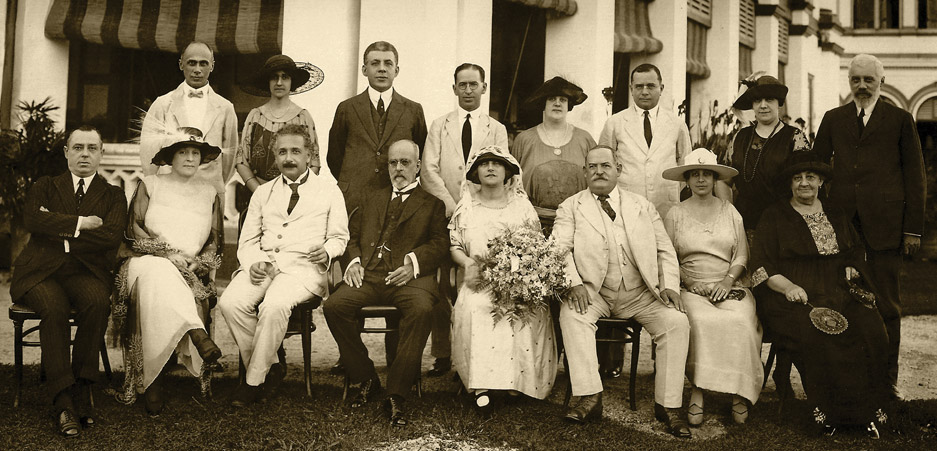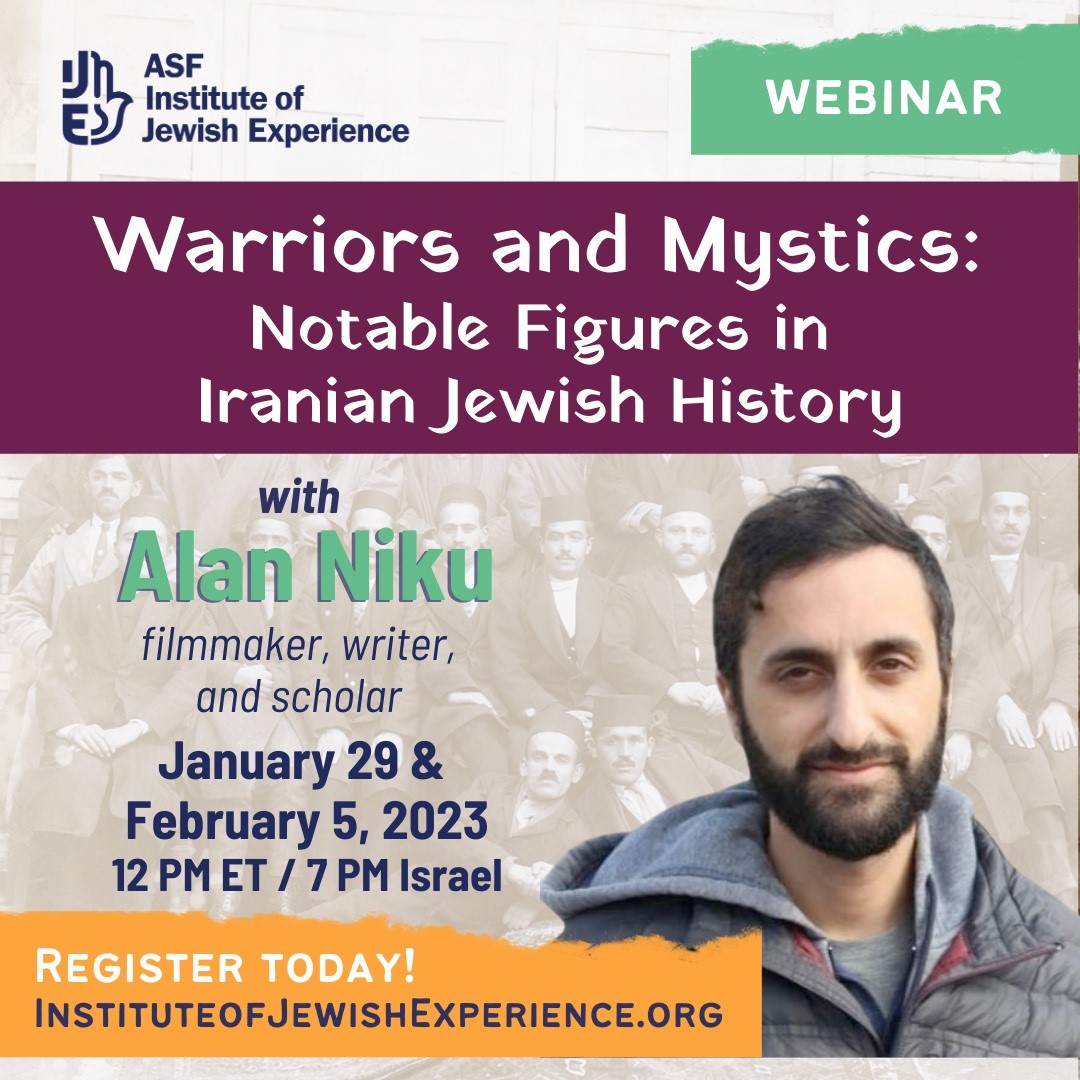Jews in Asia: From the Baghdadis to Ben Gurion & Beyond

In Memory of Hakham Ezra Reuben Dangoor, ZT”L, Rabbi of Rangoon and later Chief Rabbi of Baghdad, who was a scholar, shohet, mohel, entrepreneur, publisher, and author of multiple books, including Imrei Kohelet (a commentary and Arabic translation of Ecclesiastes)
Click here to dedicate a future issue in honor or memory of a loved one

The American Sephardi Federation’s Sephardi Ideas Monthly is a continuing series of essays and interviews from the rich, multi-dimensional world of Sephardi thought and culture that is delivered to your inbox every month.
The January, 2023, issue of Sephardi Ideas Monthly inaugurates a new series exploring 19th and 20th c. Jewish history in South and East Asia. The series’ horizons, however, will not be solely historical. Our exploration will also stop to reflect upon the relevance of recent Asian Jewish history for present-day concerns and from a variety of contemporary perspectives. Along the way, we’ll hear from writers, scholars, and public figures from across the Asian continent. But in order to frame what’s ultimately at stake in this investigation, we’ll begin in an unexpected place: Israel’s Government Yearbook.
From 1949-61, David Ben Gurion composed the preface to an annual, hard-copy “State of the Nation,” and in his 1952 preface, Israel’s first Prime Minister noted “two exceptional portents of our times.” The first was “the struggle for leadership of the world between two mighty powers, the United States and the Soviet Union.” In this struggle, Ben Gurion wisely bet on America’s success.
The second portent was “the waning hegemony of Europe and the rise of Asia.” In Ben Gurion’s view, Israel’s future flourishing depended on its capacity to also see itself as part of an Asian order:
The Homeland of the Jewish people stands upon the western edge of Asia… After two thousand years of wandering and dispersion, it is returning to its ancient Homeland in western Asia… Less than all peoples may the people of Israel shut its eyes to the rise of Asia and its peoples.
Why was the Asian context so important? Ben Gurion believed that Asia possessed a cultural vitality that was lost to Europe:
It has been enjoined upon the Jewish people, now settling again in its ancient Homeland, to know all the intellectual and cultural treasures of the peoples of Asia – Arabia, Persia, and Japan, but first and foremost India and China. In books on general history, and especially in those devoted to the history of literature and of human thought, Japan, China and India rarely find mention. This lacuna is due to the pridefulness of Europe… whose time has passed.
As for Israel:
Our people is commanded to take unto itself all the spiritual treasures of humanity, all those glittering qualities of the spirit which made the people of Israel in biblical times a teacher of mankind.
In order to understand Ben Gurion’s call for cultural receptivity, it’s important to remember that the Zionist leader saw an intimate connection between cultural and political vitality. Deeper than any political form or ideology, Ben Gurion believed that culture in its profound sense, “spiritual treasures,” provide essential energy for political communities.
The geo-political realities of “non-aligned” politics deferred the realization of Ben Gurion’s vision, but China’s growth, India’s development and the increasing strength of other “Asian Tigers” over the past few decades have demonstrated Ben Gurion’s prescience. And once circumstances permitted, Israeli governments began to realize the economic and diplomatic dimensions of Ben Gurion’s vision of Asian integration. Meanwhile, Jewish communities are flourishing in Dubai, Singapore, and Hong Kong, and even the Abraham Accords can be seen, for the parties concerned, as part of this broader trend of regional connectivity.
In this context, as the State of Israel, Jewish communities and individual Jews increasingly establish networks of connections across Asia and stand poised to play an important role in 21st c. Asian life, it’s worthwhile stepping back and remembering that the Jewish people were not complete strangers to 20th c. Asian history. A small but important chapter of 20th c. Jewish history actually played out in South and East Asia. To be more precise, from India to Singapore to China, Baghdadi Jews and Baghdadi Jewish communities – the Baghdadi diaspora − played significant roles in local business, politics, and culture. And as we’ll see at the conclusion of the series, for a brilliant but brief moment during the 1920s in Shanghai, Baghdadi Jews provided a home for a cosmopolitan, Sephardi form of Judaism from Ottoman Jerusalem. Their Judaism embodied the receptivity to Asian culture that, a generation later, Ben Gurion would envision in his preface to the Government Yearbook.
We begin the series this month in Southeast Asia with Dawei Wang’s original contribution to Sephardi Ideas Monthly, a wonderfully-written and richly-documented article, “From Zionism to Self-Rule: Singapore’s Baghdadi Jews.” Dawei Wang is a freelance journalist based in London and Athens who received his MPhil in Modern Middle Eastern Studies from the University of Oxford. This month’s essay is an adaptation of a chapter from Wang’s top-notch, Oxford thesis.
Wang sets the stage with the founding of Singapore in 1819 and the arrival of the Baghdadi Jews in the 1860s. His focus soon turns, however, to the political energies of the city-state’s Baghdadi Jews. Those energies were channeled in two directions: the Zionist project and Singapore’s independence.

Albert and Elsa Einstein (third and second to the left, first row) with the Baghdadi Jewish notables in Singapore, November 1922
(Photo courtesy of Dawei Wang/Singapore Women’s Hall of Fame)
In telling the story of Baghdadi Zionism in Singapore, Wang introduces a central character, “Manasseh Meyer, community patriarch and president of the Singapore Zionist Society.” Wang notes how:
Meyer’s strong commitment to the upkeep of Jewish institutions in the Holy Land was animated by the teachings of the esteemed Baghdadi Rabbi Yosef Hayyim Ben Elijah (known as the ‘Ben Ish Hai’). Meyer developed a close personal relationship with the rabbi and had been endowing religious institutions in Palestine since the 1880s. In 1900, he took his wife and seven children to Jerusalem to ‘inculcate in them a love for Israel.’
Wang then follows the trail of Zionist representatives, including Albert Einstein, who, upon arrival in Singapore, visited Meyer’s “white palatial residence, from which extended ample wings.” Wang also delineates the role played by Meyer’s talented daughter, Mozelle Nissim. As he delineates in impressive detail, the history of Baghdadi Zionism in Singapore was in large part a history of material support, with Meyer offering large sums in support of Jewish settlement in the Land of Israel and, as such, setting an example for the community as a whole.
After tracing the fortunes of Baghdadi Zionism in Singapore, Wang turns his attention to Jews who decided to invest in Singapore’s future. In particular, he examines the remarkable figure of David Saul Marshall.
A Singapore-born Baghdadi Jew who edited a local Jewish newspaper before serving as a soldier in defense of Singapore, during WWII David Marshall was “interned at Japanese labor camps” where he “suffered malnutrition, dysentery, and malaria.” After the war, Marshall enjoyed a career as a prominent criminal lawyer and political activist in Singapore before ultimately serving as Chief Minister of Singapore’s first elected government. He resigned his position in 1956 but continued to practice law and participate in politics before serving as Singapore’s Ambassador to several European countries. Today, a bust of Marshall sits at the entrance to the Yong Pung How School of Law at Singapore Management University.

Singapore’s First Chief Minister, David Marshall, speaking at a campaign rally in 1956 (Dawei Wang/BiblioAsia)
Next month’s issue of SIM will feature an interview with Wang, subsequent issues will include a fascinating range of perspectives on Baghdadi (and Sephardi) history in South and East Asia, and we’ll conclude with a remarkable story of Classic Sephardi Judaism and intercultural exchange in Jazz-Age Shanghai.
Sephardi Ideas Monthly is very happy to inaugurate our new series expanding and advancing the exploration of modern Jewish history in Asia with Dawei Wang’s essay, “From Zionism to Self-Rule: Singapore’s Baghdadi Jews.”
Additional Reading and Viewing:
“Zionism and Asia’s Baghdadi Jews”: Dawei Wang provides an overview of “the lesser-known story of the Baghdadi Jewish merchant diaspora in Asia during the colonial era and their involvement in the Zionist movement.”
“Between Baghdad and Asia with Dr. Sasha Goldstein-Sabbah”: Prof. Sasha Goldstein-Sabbah, the author of Baghdadi Jewish Networks in the Age of Nationalism (Brill, 2021), sits down with Dr. Drora Arussy from the ASF’s Institute for Jewish Experience to talk about “the history of Baghdadi Jews in Asia from its earliest beginning until the present day, exploring the relevance of these communities both to Baghdad and the larger Jewish world.”
Please see below for more information regarding the ASF IJE Exclusive Authors Series with Joseph Sassoon on 7 February at 12PM ET. Sassoon, the al-Sabah Chair in Politics and Political Economy of the Arab World at Georgetown University and a Senior Associate Member at St. Antony’s College, Oxford, will discuss his new book, The Sassoons: The Great Global Merchants and the Making of an Empire.
~~~~~~~

The Monthly Sage החכם החודשי

Hakham Eliyahu Yitzhak Hazan
(Photo courtesy of HeHaCham HaYomi)
The sage for the month of January is Hakham Eliyahu Yitzhak Hazan (1880-1938)
Born in Baghdad, in 1906 Hakham Eliyahu Hazan began to serve as rabbi of Hong Kong’s Iraqi community. In 1920, he moved to Shanghai to officiate as rabbi of the local Iraqi community there. In 1930, Hakham Eliyahu made Aliya to Israel, settling in Jerusalem, before passing away on the 1st of Nissan, 5698 (1938). Hakham Eliyahu Hazan was buried on the Mount of Olives.
Hakham Eliyahu’s writings were collected in Yad Eliyahu, a series of books featuring legal Responsa, piyyutim, and commentaries on Biblical texts.
In the following passage from Yad Eliyahu, Hakham Eliyahu interprets a seeming redundancy in Psalms 27: 14 to teach the virtue of spiritual resilience and not giving in to despair:
Psalms 27, 14: ‘Look to the LORD; be strong and of good courage! O look to the LORD!’
Question. Having said Look to the LORD’, why does he go on to say ‘O look to the LORD’? Once would suffice, it being known that His mercy is great, as has been said: “The LORD is good unto them that wait for Him, to the soul that seeks Him” – He who waits for Him will be fully blessed, goodness will not be withheld from those who are wholehearted, why is repetition necessary? Inform us, and be recompensed by heaven.
Answer: The verse repeats a second and third times so as to instruct us in strengthening our faith in God. Should a person be in distress, may this not occur, and request God’s mercy yet remain unanswered, he should not be weak of heart and avoid requesting mercy again, but should return, a second and third time, and ask for God’s mercy, and place his faith in God above…
This verse also teaches about the redemption, may it arrive speedily in our day amen, that even after the exile’s length we will at long last be remembered before Him, blessed be He, who will hasten the redemption in our day amen, as He promised us in our holy Torah: “then the LORD your God will restore your fortunes and take you back in love “, and several powerful promises by his servants, the prophets. Our faith in G-d, blessed be He, remains strong, and He will fulfill his promise and redeem us to eternal redemption speedily in our days, amen.
~~~~~~~

From Generation to Generation: a Legacy of Faith and Tolerance
By David S. Malka
From Generation to Generation: a Legacy of Faith and Tolerance is dedicated to the memory of Rabbi Shlomo Malka. It honors his memory as a Jewish scholar, a spiritual leader, and a great humanitarian.
David S. Malka is publishing this text as his personal contribution to legacy of Malka family, in the hope that this generation will re-discover their patriarch’s teaching and advance his message of faith and compassion on to the next generation.
From Generation to Generation: a Legacy of Faith and Tolerance is a message of love, tolerance, and pride in one’s heritage.
A Pizmonim: Sephardic-Hebrew Songs of the Middle East, Volume 1
By David Elihu Cohen
Pizmonim, a unity of poetry and song, have been an integral part of the Jewish People and may be traced in the Bible to the very beginning of our history.
The twelve selected Pizmonim contained in this booklet serve to perpetuate the Greater Sephardic culture and tradition of singing praise to the Lord on all joyous occasions.
~~~~~~~
The Belzberg Program in Israel Studies at the University of Calgary and the Schusterman Center for Israel Studies at Brandeis University. With the collaboration of the American Sefardi Federation, Centro Sefarad Israel, and the International Network for Jewish Thought present:
Sephardi Modernities Seminar Series, 2023
Join us as we explore the relationship between our narratives about the past and the future to which we aspire. The ways in which scholars approach the stories, events, characters, and historical processes of the Sephardi/Levantine past are inevitably guided by values, by their moral and political beliefs. Which elements of the past do they strive to preserve, reclaim and grant continuity? What are they trying to say about a potential future? Which stories become part of canonized history, and which ones are dismissed as mere anecdotes? Which theoretical, social, political, and cultural frameworks do they wrestle with, and which do they seek to advance?
On Zoom
(Registration is required for each session)
2 February at 12:00PM EST
The Sephardi-Moorish Atlantic: The Two 1492s and the Multi-Chronotope of Orientalism
Ella Shohat, New York University, in conversation with Yuval Evri, Brandeis University
Sign-up Now!
14 March at 12:00PM EST
Preservation of Jewish Heritage and Debating Egypt’s Past and Present
Yoram Meital, Ben-Gurion University of the Negev
Sign-up Now!
23 March at 12:00PM EDT
How Do Judeo-Spanish Proverbs and Tales Communicate with Us and How Do We Communicate With Them?
Lital Belinko-Sabah, Hebrew University of Jerusalem
Sign-up Now!
18 April at 12:00PM EST
‘Modernity’ and ‘Tradition’ on the Move: Spanish Moroccan Jews and their Diasporas
Aviad Moreno, Ben-Gurion University of the Negev, in conversation with Angy Cohen, University of Calgary
Sign-up Now!
9 May at 12:00PM EST
Sephardi Musical Modernities: Listening to the Past in the Future
Edwin Seroussi, Hebrew University of Jerusalem
Yair Dalal, Composer, violinist, oud player, singer, and teacher
Sign-up Now!

Throughout this year’s series we will discuss the future invoked by each way of looking at the past, the political agendas of historical research, and the values that unavoidably guide scholastic inquiry. Topics include the transmission of narratives among collectives and among researchers, ownership of archives, encounters with the past, the academic legitimacy of certain topics and collectives, vehicles of memory (music, oral history, proverbs, etc.) and the construction of historical narratives.
Organized by Dr. Angy Cohen, Inaugural Hy and Jenny Belzberg Postdoctoral Associate in Israel Studies, Department of Anthropology and Archaeology at the University of Calgary, and Dr. Yuval Evri, Assistant Professor of Near Eastern and Judaic Studies on the Marash and Ocuin Chair in Ottoman, Mizrahi, and Sephardic Jewish Studies, Brandeis University.
~~~~~~~
The ASF Institute of Jewish Experience presents:
Warriors and Mystics
Iran’s Jewish community is one of the oldest diaspora communities in the world. But is there more to those 2700 years than Queen Esther and the Islamic Revolution? This talk examines the lesser-known parts of Iran’s Jewish History, a vast story of prophets, autonomous nations, divergent sects, epic poetry, and political intrigue.
Through the music, languages, foods, writings, traditions, and stories of two millennia, along with their ties to neighboring and faraway communities, the Jews of Iran have forged a culture at once Persian and Jewish, with traditions and aesthetics uniquely their own. In this two-part series, we will explore notable personalities in this rich history, from over 1,500 years ago and more recently.
On Sunday
5 February at 12:00PM EDT
Sign-up Now!
(Registration is required for each session; Tickets: $11)

About the speaker:
Alan Niku is a filmmaker, writer, and scholar of Mizrahi culture from San Luis Obispo, California, based in Los Angeles. A native speaker of Persian, he spends his time learning related Jewish languages, deciphering Judeo-Persian manuscripts, and interviewing community members about their stories. He is also a musician and an amateur chef, teaches history and Jewish heritage at various levels, and seeks to educate the world about the underrepresented cultures of the Middle East through his writing and films.
Sponsorship opportunities available:
The ASF Institute of Jewish Experience presents:
Exclusive Authors Series with Joseph Sassoon
Join us for a new episode of Exclusive Authors Series with Joseph Sassoon discussing his new book “The Sassoons: The Great Global Merchants and the Making of an Empire.”
Tuesday, 7 February at 12:00PM EDT
(Complimentary RSVP)
Sign-up Now!

About the book:
The influential merchants of the nineteenth and early twentieth centuries shaped the globalization of today. The Sassoons, a Baghdadi-Jewish trading family, built a global trading enterprise by taking advantage of major historical developments during the nineteenth century. Their story is not just one of an Arab Jewish family that settled in India, traded in China, and aspired to be British. It also presents an extraordinary vista into the world in which they lived and prospered economically, politically, and socially.
The Global Merchants is not only about their rise, but also about their decline: why it happened, how political and economic changes after the First World War adversely affected them, and finally, how realizing their aspirations to reach the upper echelons of British society led to their disengagement from business and prevented them from adapting to the new economic and political world order.
About the author:
Joseph Sassoon is the Director of the Center for Contemporary Arab Studies and Professor of History and Political Economy at Georgetown University. He holds the al-Sabah Chair in Politics and Political Economy of the Arab World. He is also a Senior Associate Member at St Antony’s College, Oxford. In 2013, his book Saddam Hussein’s Ba‘th Party: Inside an Authoritarian Regime (Cambridge University Press, 2012) won the prestigious British-Kuwait Prize for the best book on the Middle East. Sassoon completed his Ph.D at St Antony’s College, Oxford. He has published extensively on Iraq and its economy and on the Middle East. His latest book is titled: The Sassoons: The Great Global Merchants and the Making of an Empire (Pantheon, 2022).
Sponsorship opportunities available:
~~~~~~~
ASF Broome & Allen & ADL Collaborative for Change Fellow Isaac de Castro presents:
Entre Diasporas: Telling the Latin-American Jewish story. Contando la historia judía latinoamericana

Tell your story. Cuenta tu historia.
We’re looking for first-generation Latino Jews in the United States who immigrated because of political and social turmoil. Jews of Sephardic descent from Colombia, Cuba, and Venezuela that now reside in the Miami area will be given priority, but others are welcome to apply as well.
Fill out this form to be considered as an interviewee for this project. After you’ve submitted, we will be in touch promptly to set up a preliminary phone call.
Click here for more information.